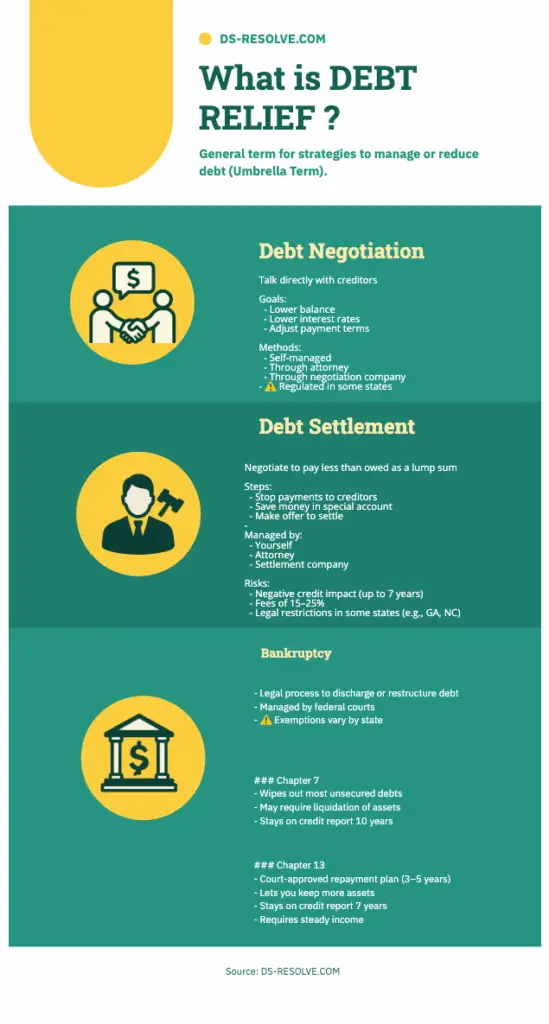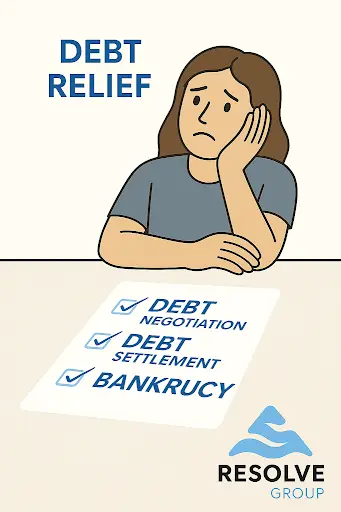Debt Relief vs Negotiation, Settlement & Bankruptcy
Understand the key differences between debt relief, negotiation, settlement, and bankruptcy. Learn how laws and risks vary by state.
Debt Relief vs. Debt Negotiation, Reduction, Settlement, and Bankruptcy
American consumers often face a maze of debt solutions, each described with overlapping or vague terms. Understanding the differences between debt relief, debt negotiation, debt reduction, debt settlement, and bankruptcy is critical to making informed financial decisions. This guide breaks down each term, highlights the differences between them, and explains why state regulations are essential.
Why Are Debt Terms So Confusing?
The language around debt solutions is often unclear. Terms like “debt relief,” “debt negotiation,” and “debt reduction” are sometimes used interchangeably, although they have distinct meanings. This confusion is compounded by the fact that state laws and regulations can affect which services are available and how they operate.
Purpose of This Article:
This guide explains each major debt solution, clarifies how they differ, and helps you understand which options might be best for your situation. We will also highlight how state laws can influence your choices.
Debt Relief: The Umbrella Term
What Is Debt Relief?
Debt relief is a broad category that covers any strategy or program designed to make your debt more manageable. It can include:
- Negotiating with creditors to lower the amount owed
- Restructuring payment terms
- Consolidating multiple debts into one payment
- Settling debts for less than the full balance
- Filing for bankruptcy
Key Points:
- Debt relief is not a specific program but a catch-all term for various solutions.
- Methods under this umbrella include negotiation, settlement, consolidation, and bankruptcy.
- Regulations and access to debt relief programs can vary from state to state.
Debt Negotiation
Definition:
Debt negotiation is the process of working directly with creditors to lower the amount you owe or to renegotiate your payment terms.
How It Works:
- You can negotiate on your own (self-managed), with an attorney, or through a debt negotiation company.
- The goal is to secure a lower balance, reduced interest rate, or more manageable payment plan.
State Regulations:
Some states regulate who can legally negotiate debt. For example, certain states require companies or individuals to be licensed, and others may restrict the fees that can be charged.
Methods:
- Self-managed: You contact creditors directly.
- Via attorney: Legal expertise can help protect your rights.
- Via company: Specialized firms negotiate on your behalf.
Important:
Always check your state’s laws before hiring a debt negotiation company or attorney, as requirements and consumer protections vary.
Debt Reduction
Definition:
Debt reduction is primarily a marketing term rather than a formal legal or financial process.
What It Means:
- Often refers to any method that reduces your overall debt, such as negotiation, settlement, or consolidation.
- It may involve lowering your balance, reducing interest rates, or changing payment terms.
Warnings:
- The term is loosely defined and sometimes used to promote unverified or misleading offers.
- Be cautious of companies promising dramatic debt reduction without clear explanations or credentials.
Debt Settlement
Definition:
Debt settlement is a structured process where you (or a company acting for you) negotiate with creditors to accept less than the full amount owed as a final payment.
How It Works:
- Typically, you stop making payments to creditors and instead save money in a dedicated account.
- Once sufficient funds are available, a lump sum is offered to the creditor, who may accept it as payment in full.
- Debt settlement can be managed by yourself, an attorney, or a debt settlement company.
Credit Impact:
- Stopping payments can significantly damage your credit score, as missed payments and settled accounts are reported negatively to the credit bureaus.
- A settled debt will remain on your credit report for up to seven years.
State Regulations:
- Some states, such as Georgia and North Carolina, require an attorney to handle debt settlement legally.
- Always research your state’s rules before proceeding.
Costs:
- Debt settlement companies typically charge 15–25% of the total debt enrolled.
Bankruptcy (Chapter 7 and Chapter 13)
Overview:
Bankruptcy is a legal process managed by federal courts to help individuals or businesses eliminate or restructure unmanageable debt.
Chapter 7 Bankruptcy
- Wipes out most unsecured debts (like credit cards and medical bills)
- May require liquidation of assets to pay creditors
- Stays on your credit report for 10 years
- It can make it difficult to obtain credit, rent, or employment in the future
- State-specific exemptions determine what property you can keep
Chapter 13 Bankruptcy
- Involves a court-approved repayment plan over 3–5 years
- Allows you to keep more assets, including your home
- Stays on your credit report for 7 years
- Requires regular income to qualify
State Differences:
Bankruptcy exemptions, which determine the property you can keep, and procedures vary by state. Some states allow you to choose between federal and state exemptions, but you cannot mix them.
Comparison Table
Solution | Definition | Credit Impact | Duration | State Regulated | Average Cost | Best For |
Debt Relief | General category of debt resolution methods | Varies | Varies | No | Varies | Broad range of consumers |
Negotiation | Lowering amount or adjusting terms via creditor | Moderate | 3–12 months | Yes (some states) | Low to Moderate | DIY or guided users |
Reduction | Vague marketing term, loosely defined | Unknown | Unknown | Not specifically | Unclear | Must be approached cautiously |
Settlement | Partial repayment accepted as full settlement | High (short-term) | 2–4 years | Yes (some states) | 15–25% of debt amount | Serious debt, behind on payments |
Bankruptcy | Legal discharge or restructuring of debt | Very High | 6 mos – 5 years | Heavily regulated | Attorney + filing fees | Severe and unmanageable debt |
Applicability to Debt Types
Not all debt solutions work for every type of debt. Here are some examples:
- Credit Card Debt: Commonly settled or negotiated.
- Medical Debt: may be reduced or forgiven, depending on the provider’s policies.
- Student Loans: Federal loans are rarely settled or discharged, except in rare circumstances.
- IRS Debt: Follows specific legal frameworks and may require specialized solutions.
Discover the various types of debt and the corresponding solutions that best suit each.
Conclusion
There is no one-size-fits-all solution for debt. The right choice depends on your specific situation, the type of debt you have, and the laws in your state. Before committing to any debt solution, seek legal advice and research state-specific regulations to protect your rights and financial future.
Need help evaluating your options based on your state laws?
Our team can connect you with verified professionals.


